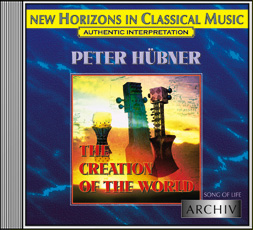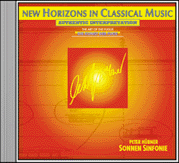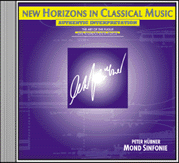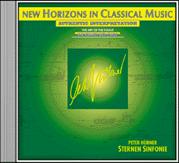The
Future of the
Classical Symphony
JOURNALIST: Herr Hübner, from your books I take it, that you also support entirely new views in the field of symphonic music. What can you tell us about that?

PETER
HÜBNER: Following “Song of life”, I began with my
symphonic work, and in this respect, I have also continued the personal ethical
interests of the great classical tone creators. A symphony belongs to so-called
“absolute music”.
Contrary to the ideas of a large number of experts, the work of our great
classical tone creators – as far as it belongs to the area of absolute
music – is by no means music detached from human evolution, which is
perhaps even played for its own sake, but this is an ideal language to
describe and/or
present the field of life of inner human powers based on emotion and mind.
Therefore, this music belongs by nature to the field of philosophy or the
art of life – where it then also links with religious music.
This kind of absolute music, which has human dignity as its sole theme, finds
its best expression in a symphony, and here, in particular, with Haydn, Mozart
and Beethoven, who, as is well-known, were not mainly committed to music but
to truth, and they regarded music as the best means known to them to express
truth on an emotional and intellectual level.
And these two main human powers, emotion and mind, are the pillars of symphonic
creation of our great tone creators for their musical evolution of natural
human dignity.
Whilst universities, schools and official educational institutions are devoted
to teaching outer skills, the great classical tone creators regarded it as
their holy duty to educate man in the use of his inner skills – to introduce
to him his inner human skills as such, to teach him to differentiate between
his inner human powers, and to train him to use his inner skills in a balanced
and successful way.



JOURNALIST:
You are working on a cycle of several symphonies, the first of which is the
“SunSymphony”. Which other symphonies are part of this cycle?
PETER HÜBNER: Altogether, there will be nine symphonies: the “SunSymphony”,
the “MoonSymphony”, and the “StarSymphony”, as well as
the five symphonies of the earth, water, fire, air and space. These eight
symphonies find their common basis in the ninth symphony, the “Symphony
of Life”.
In these nine symphonies I want to show the complex play of the inner and
outer natural powers in human life according to the rules of the classical
symphony, and at the same time, open new doors for the musical craft.
In this cycle, I try to show the field of inner-human development, according
to the rules of the classical symphony. In this respect: Nothing fundamentally
new!
JOURNALIST: Herr Hübner, you consciously
hold your musical work in the tradition of the great classical composers.
But as you very often also employ electronic means to realise your work, even
experts keep asking, why you, in particular, who is so committed to nature,
very frequently use electronic means, and not exclusively and logically “natural”
instruments?
PETER HÜBNER: If a composition has matured
in me, then I hear it inside, sounding full of life.
Nowadays, many so-called fans of classical music say that music can only be
called classical, when it is performed with the instruments of a classical
orchestra.
This only shows
that these musical experts have no insight into the process of the natural
creation of music.
Nature creates a classical composition in a tone creator, not as a song of
praise to instruments – natural music creation is not an acoustic end
in itself: when a natural composition is created in the mind, i.e. when nature
brings out a piece of music in the composer’s creative imagination, then
it does so to stimulate the natural evolution of his diverse inner powers
of life.
© A A R E D I T I O N I N T E R N A T I O N A L 2001
| Site Map |
| Editorial |
| about us |
| MUSIC |
| SYMPHONIC MUSIC |
| The
Future of the Classical Symphony |
| Peter Hübner |
| R & D |
| International Experts |
| International Media |
| Asian Media |
| Main Links |
| STORE |